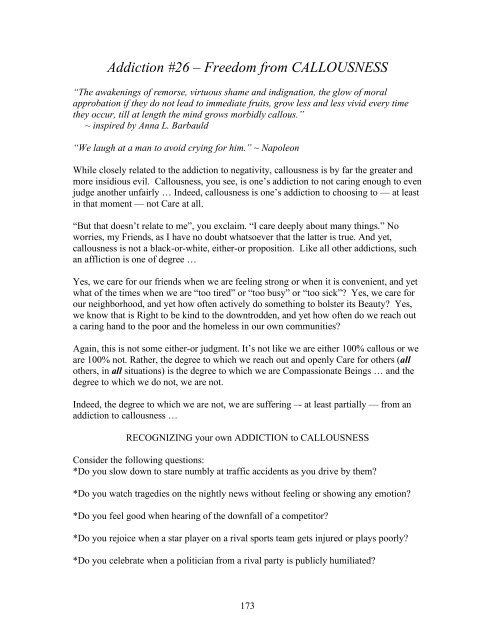Licking the Razor's Edge (2015)
Recognizing the hidden addictions that bind you, … to then set your True Self free
Recognizing the hidden addictions that bind you,
… to then set your True Self free
Create successful ePaper yourself
Turn your PDF publications into a flip-book with our unique Google optimized e-Paper software.
Addiction #26 – Freedom from CALLOUSNESS<br />
“The awakenings of remorse, virtuous shame and indignation, <strong>the</strong> glow of moral<br />
approbation if <strong>the</strong>y do not lead to immediate fruits, grow less and less vivid every time<br />
<strong>the</strong>y occur, till at length <strong>the</strong> mind grows morbidly callous.”<br />
~ inspired by Anna L. Barbauld<br />
“We laugh at a man to avoid crying for him.” ~ Napoleon<br />
While closely related to <strong>the</strong> addiction to negativity, callousness is by far <strong>the</strong> greater and<br />
more insidious evil. Callousness, you see, is one’s addiction to not caring enough to even<br />
judge ano<strong>the</strong>r unfairly … Indeed, callousness is one’s addiction to choosing to — at least<br />
in that moment — not Care at all.<br />
“But that doesn’t relate to me”, you exclaim. “I care deeply about many things.” No<br />
worries, my Friends, as I have no doubt whatsoever that <strong>the</strong> latter is true. And yet,<br />
callousness is not a black-or-white, ei<strong>the</strong>r-or proposition. Like all o<strong>the</strong>r addictions, such<br />
an affliction is one of degree …<br />
Yes, we care for our friends when we are feeling strong or when it is convenient, and yet<br />
what of <strong>the</strong> times when we are “too tired” or “too busy” or “too sick”? Yes, we care for<br />
our neighborhood, and yet how often actively do something to bolster its Beauty? Yes,<br />
we know that is Right to be kind to <strong>the</strong> downtrodden, and yet how often do we reach out<br />
a caring hand to <strong>the</strong> poor and <strong>the</strong> homeless in our own communities?<br />
Again, this is not some ei<strong>the</strong>r-or judgment. It’s not like we are ei<strong>the</strong>r 100% callous or we<br />
are 100% not. Ra<strong>the</strong>r, <strong>the</strong> degree to which we reach out and openly Care for o<strong>the</strong>rs (all<br />
o<strong>the</strong>rs, in all situations) is <strong>the</strong> degree to which we are Compassionate Beings … and <strong>the</strong><br />
degree to which we do not, we are not.<br />
Indeed, <strong>the</strong> degree to which we are not, we are suffering –- at least partially — from an<br />
addiction to callousness …<br />
RECOGNIZING your own ADDICTION to CALLOUSNESS<br />
Consider <strong>the</strong> following questions:<br />
*Do you slow down to stare numbly at traffic accidents as you drive by <strong>the</strong>m?<br />
*Do you watch tragedies on <strong>the</strong> nightly news without feeling or showing any emotion?<br />
*Do you feel good when hearing of <strong>the</strong> downfall of a competitor?<br />
*Do you rejoice when a star player on a rival sports team gets injured or plays poorly?<br />
*Do you celebrate when a politician from a rival party is publicly humiliated?<br />
173


















